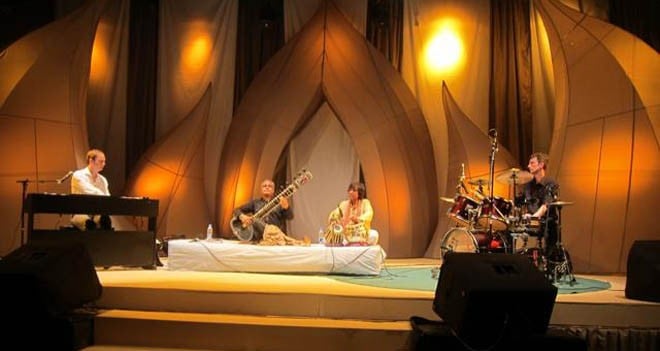
Various musical traditions were played together at the concert, World Music -- Berlin to Lahore, held at the Rafi Peer Theatre Workshop in Lahore last week

The Annemarie-Schimmel-Haus (German Cultural Centre Lahore) in collaboration with the Goethe-Institut Pakistan and Rafi Peer Theatre Workshop (RPTW) hosted a fusion concert, World Music - Berlin to Lahore, at the Rafi Peer Theatre Workshop (Peeru’s Café), last week.
This was not the first time that the group of musicians calling themselves Berlin to Lahore performed in Lahore. About two years ago, they put up a quizzically delightful show, which was more challenging, because of fusion of sounds that raised more questions than laid to rest them with answers that flowed from a musical resolution of sorts.
In this concert as well the same processes was adopted with the same consequences. Various musical traditions, which had been nourished under different historical exigencies and conditions, were played together, enhancing the tonal pattern that is becoming universally more familiar these days.
Under the generic label of World Music -- Berlin to Lahore, the group was formed in 2012, when German pianist and composer Christoph Reuter and sitar player Ashraf Sharif Khan, who is from Lahore and now lives in Germany, met each other at a festival and came up with the idea of collaborative music. Thomas Ruediger, a percussionist from Berlin, also joined them and the trio, Berlin to Lahore, was born. Later on, they introduced Shahbaz Hussain as a guest tabla player from Lahore.
The group is currently on tour of Pakistan.
Ashraf Sharif Khan, son of late maestro Ustad Mohammad Sharif Khan Poonchwale, is regarded among the finest sitar instrumentalists of his generation.
Christoph Reuter studied jazz piano and music education at the Academy of Music Hanns Eisler in Berlin and Felix Mendelssohn Bartholdy in Leipzig. As a composer, he writes for theatre, orchestra and various bands. He travels the world as a pianist and, since 1999, he has been active as a music teacher, teaching in the field of jazz piano, composition and songwriting.
Thomas Ruediger on drums is distinguished by an unusual sound concept in which classic drums meet world music instrumentation. Since 2002, he has been receiving tabla lessons from Sajal Karmakar (Calcutta).
Shahbaz Hussain is one of the most promising tabla players of his generation. He has received numerous awards, including receiving the prestigious "Son of Lahore" award from the government of Pakistan in 2008. Hussain began his grooming in the art of tabla at the age of five with his father, the late Ustad Mumtaz Hussain.
The current vogue in all art forms, including music, is that of fusion -- of bringing the various musical traditions together. This had to be the consequence of the world becoming a smaller place and shrinking due to the various advances in technology that has made distances irrelevant. Through the internet and the web, it is an everyday reality of experiencing events and being influenced by people who are otherwise thousands of miles away, but their presence and the happenings seems to be here and imminent.
This has resulted in a meeting to cultures at one point, perhaps at the level of appearance, simultaneously exposing the deep differences that exist between people, cultures and societies. The sudden coming together has also resulted in a kind of a violence that may be more apparent in its physical form in the world as events play out, and in art more subtle, "Being yoked together as if by violence", as expressed by T.S.Eliot.
In the traditional sitar concert, Ashraf Sharif Khan is in a familiar role, but his being part of a four-person group, when he played fusion music here a couple of years ago, was quite an unfamiliar role to those who had not seen him perform over the past decade or so outside Pakistan. When he left for Europe, one kept wondering what he was doing there and what music was he making. On hearsay, and in recordings on YouTube, one got to know that he was not only playing the sitar, solo, but was also associated with some band and performed with them as well as one of the musicians. As is the wont, these bands play music that is eclectic and build on musical influences that are pouring in from all over the world -- and probably regale in this trend of fusing the musics of various cultures together.
Maybe musical insularity, which was the pride of a cultural tradition of a society, is a thing of the past. Musicians in the subcontinent refused to share their musical knowledge with others -- from another vani or gharana -- and even refused to listen to others from a different tradition for the fear of losing the touch of their individuality.
There are countless tales of such occurrences taking place here and these are cited as examples of maintaining religious or caste purity, but it was in tandem also a cause for maintaining the purity of a musical tradition. The more classical the form, the more distinct was this characteristic -- though in the other popular or lok forms greater intervention was taking place at the time with no guardians warding off the external influences from corrupting a tradition. This is not to say that the interaction did not take place -- it did, over a period of time and was best described as assimilation.
These days, it is more like cut and paste. There is nothing negative about the phrase ‘cut and paste’ because it is the reality of our times -- and is unavoidable.